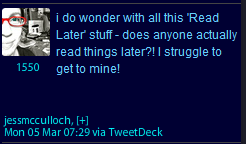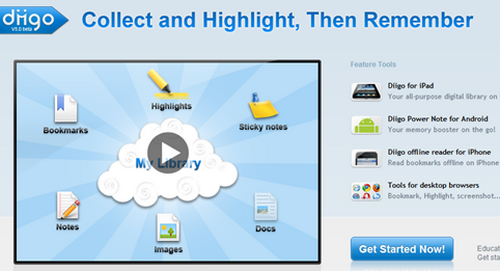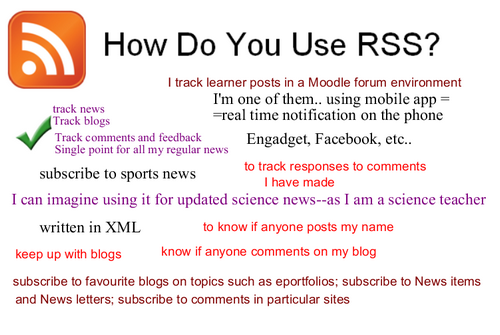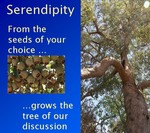Introduction
This post was triggered by a tweet from Jess McCulloch (@jessmcculloch) that initiated a train of thought much longer than suggested by her original question.
 Jess’s tweet raised the issue of the “Read later” tag/list asking does anyone get round to their “Read later”s. I sent a reply to the effect that I never use “Read later” options as I know perfectly well that I will never read them! This started me thinking about what I do actually do with respect to dealing with the myriad links and posts that cross my desktop each day.
Jess’s tweet raised the issue of the “Read later” tag/list asking does anyone get round to their “Read later”s. I sent a reply to the effect that I never use “Read later” options as I know perfectly well that I will never read them! This started me thinking about what I do actually do with respect to dealing with the myriad links and posts that cross my desktop each day.
My online “imperatives”
These are some of my personal strategies (other than using an iGoogle page for easy access to many things):
- Don’t try to read/view (or promise myself to read/view) everything that passes across my desktop.
- Don’t collect “read later” lists because I know I won’t do it.
- Have in my GoogleReader feed only very few feeds from blogs I have a particular reason to follow. Even then I don’t expect to read them all in depth or even at all.
- Skim anything that attracts my immediate attention eg from the title or topic mentions and then tag with Diigo. That way I can find it with a search of my Diigo tags.
- Adopt a read it when I need it approach – hence skimming & tagging in Diigo for those items that interest me at first glance rather than reading them in depth.
- Adopt a find it when I need it approach – use my search skills to find what I need when I need it then tag in Diigo for future use. This saves me inordinate amounts of time as I rarely read, and therefore don’t catalogue/tag, an item until I need it.
- Use different bookmarking applications for different purposes – for example all my virtual room links and a number of frequent access sites are saved via Google Bookmarks for easy access whereas I use Diigo for web pages, blog posts etc that need to be tagged for me to find relevant ones.
- Never re-share, re-tweet, re-post links without reading or at least skimming them first! This is one reason that I don’t re-tweet often. I know it is counter to the way most people operate on Twitter but I am unwilling to re-share anything I haven’t accessed myself!
- With anything that gives me a daily/weekly email of updates I rarely open these until I want information from them. I simply file them in a folder labelled with the source and then access & keyword search the folder.
Conclusion
I think I am lucky in that I remember key information relating to things that interest me (I have a magpie mind) even if they have only been briefly mentioned or have been submerged in other content. Also I am a relatively good “searcher” and usually find it easy to access the information I need quite quickly when I need it!.



